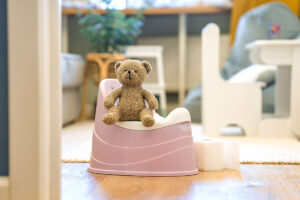Taking care of children who have experienced loss, chaos, or exposure to alcohol or drugs before birth can be a big job, especially when it comes to potty training. These children may face extra challenges to conquer potty training, but with understanding, patience, and respect, you can support them in learning this important skill.
Understanding the Challenges
 Children with prenatal substance exposure often have struggles like:
Children with prenatal substance exposure often have struggles like:
- Strong or weak responses to touch, sounds, smells, or sight
- Trouble with change or new routines
- Delays in language, memory, or thinking
- Problems with coordination, balance, or motor skills
- Attention difficulties—being impulsive or easily distracted
Because of these struggles, learning everyday tasks like potty training can take more time and effort.
Understanding a Child’s Readiness to Potty Train
To help this child be successful with the skills needed for potty training, consider their readiness. These questions can help you determine if they are developmentally ready, not just the “right age.
- Do they notice the difference between wet and dry?
- Can they stay dry for at least two hours?
- Do they know when they need to pee or poop?
- Can they get to the potty with help?
- Can they pull their clothes up and down?
- Do they try to use the potty or seem interested?
If you answered “yes” to most of these, your child may be ready now, even if “now” feels later than you’d hoped or expected.
How to Start Potty Training
1. Track what’s happening.
Before potty training, write down when your child pees or poops—all day for about 3–5 days. Check every 15 to 30 minutes and note if their diaper is wet, dry, or soiled.
2. Learn their patterns.
Review those notes to find what times of day they are most likely to be and consistently peeing or pooping. This information will help you know when to put them on the potty to start normalizing its use.
3. Try scheduled potty visits.
Around those trending times, take your grandchild (or nephew or niece) to the potty 5 minutes early. Use lavish praise and exciting rewards when they go successfully. Some kids might need big encouragement and praise just for sitting at first. However, stay calm and avoid showing frustration if they don’t go or don’t want to stay seated.
4. Use visual help to support your efforts.
- A picture chart showing when to go can be useful.
- Reward them with stickers or stars right after they try.
- Sign language (like “potty,” “wet,” or “dry”) can offer gives extra help for kids who struggle with words.
These signals can be empowering, especially if language is still developing.
5. Teach your relative child how to clean up.
When they have an accident, show them how to clean themselves and their clothes step by step. Practice it together several times and be patient with their progress.
Then, repeat the potty routine steps three times to build memory skills.
6. Adapt to Fears
Some children who have experienced neglect, abuse, or other challenges before coming to live with you may have fears to grapple with. They may be scared of the noise of the toilet flushing. The cold seat may be startling or uncomfortable. Kids with sensitive noses may find it too hard to handle bathroom smells at first. Be patient and figure out if there are creative solutions you can work on together, like warming the seat or choosing pleasant air fresheners they do like.
7. Make potty time a positive, connecting experience.
When you are starting this new skill building experience, be present fully to lend your calm, regulated self. Sitting with them, making up little songs, reading books, and other things that make potty time feel safe and fun will support their confidence and eventual success. Use gentle reminders and praise: “You’re learning, and you’re doing great.”
Practice and Keep Practicing
Don’t expect your grandchild to master everything at once. Maybe start by helping them signal when they need to go. Once they’ve conquered that, then move on to pulling down clothes, sitting, wiping, and washing hands. Each small skill must become familiar before adding the next.
Because of their unique challenges, this child may potty train more slowly. It could take a few months or up to a year. That’s okay, there are many additional lessons they are learning in the process: trust, dignity, and success. But they can succeed—especially with your consistent love, support, and presence. And by caring for your relative child this way, you help them grow in trust, independence, and self-esteem. Potty training is more than a skill—it’s a step toward healing and strength.
